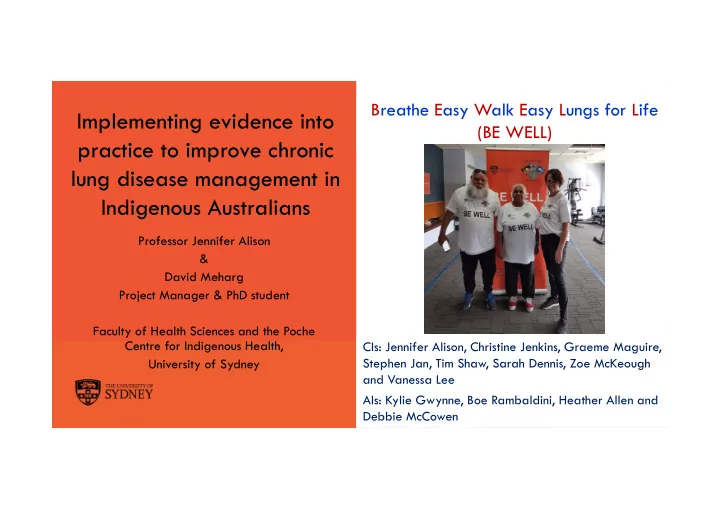

Breathe Easy Walk Easy Lungs for Life Implementing evidence into (BE WELL) practice to improve chronic lung disease management in Indigenous Australians Professor Jennifer Alison & David Meharg Project Manager & PhD student Faculty of Health Sciences and the Poche Centre for Indigenous Health, CIs: Jennifer Alison, Christine Jenkins, Graeme Maguire, Stephen Jan, Tim Shaw, Sarah Dennis, Zoe McKeough University of Sydney and Vanessa Lee AIs: Kylie Gwynne, Boe Rambaldini, Heather Allen and The University of Sydney Page 1 Debbie McCowen
BE WELL Overview – Aim and research question – Study design, methods and outcome measures – Knowledge to Action Framework – BE WELL study flowchart – Project to date – Reflections The University of Sydney Page 2
Aim and Research Question BE WELL aims to: – Build the capacity of Aboriginal Medical Services in New South Wales, Australia to provide effective management of Chronic Obstructive Pulmonary Disease (COPD), through pulmonary rehabilitation. Research Question – Can pulmonary rehabilitation be implemented in Aboriginal Medical Services and achieve improved health outcomes for Aboriginal people with chronic lung disease? The University of Sydney Page 3
Study Design – Implementation Science The University of Sydney Source: NIH, CTSA model Thanks to Dr Nicole Rankin Page 4
Methods and outcome measures – Research uses mixed methods – Participants: 1. Aboriginal Health Workers trained as BE WELL program leaders 2. Aboriginal people with chronic lung disease completing BE WELL 3. Aboriginal Medical Services implementing BE WELL The University of Sydney Page 5
Participants What to measure How (Pre and Post BE WELL) • • 1. Aboriginal Knowledge and Questionnaire Health Workers confidence managing COPD • Quality of Life • Questionnaire 2. People with • Exercise capacity • 6-minute walk test chronic lung • Experience of care • Yarning circle disease • COPD hospital • Compare COPD hospital admission and cost of admissions 12 months before care and after BE WELL program • • 3. Aboriginal Respiratory services Questionnaire Medical Service available for people with chronic lung disease The University of Sydney Page 6
Ongoing mentoring Evaluate pre / post workshop: Monitoring of pulmonary Health worker outcomes: rehabilitation sessions • Knowledge, confidence, skills KNOWLEDGE Select Assessment tools Monitor Knowledge Level 1 evidence for Tailor Pulmonary rehabilitation retention and use Pulmonary Rehabilitation Review Implementation strategy Guidelines Australia COPD-X & PR Evaluate: Assess Barriers to Implementation: • Service delivery outcomes BEWE • Service Delivery Inventory • Patient outcomes resources • Patient Experience • Focus Groups • Implementation experience Adapt knowledge to Local Sustainability ACTION CYCLE Context in 4 Distinct Policy impact Aboriginal Medical Services The Problem - COPD Indigenous communities: • High incidence COPD • High rates hospitalisation • Limited access to best-practice management COPD The University of Sydney Page 7 BEWE= Breathe Easy, Walk Easy
BE WELL flowchart Pre-study Community Engage Ethics approval Gain consent supports research Communities protocol Recruitment & Training & Baseline data collection BE WELL Complete Service Recruit Aboriginal Start Cert IV Allied Workshop Questionnaire Health Workers Health Assistant Pre/Post Survey Develop & support the intervention (PR) Support to 3 month follow up establish a PR Recruit patients Telehealth Support support program on site Collect outcome data for patients and services Qualitative Economic and Telehealth support Data collection interviews - all hospital admission of program stakeholders data The University of Sydney Page 8
Project to date Commenced BE WELL at first site and delivering a second program and adapting to local context Conducted a BE WELL Awareness Day Completing a systematic literature review - Global Indigenous Pulmonary Rehabilitation Reviewing 18 years of NSW COPD hospitalisation data Identifying three additional NSW Aboriginal Medical Services to implement BE WELL The University of Sydney Page 9
1 BE WELL Program Pathway 2 Patient has a consultation with GP Follow‐up letter to GP 5 Clients GP/Medical assessment BE WELL Program Suitable for Not suitable Client completes New client registration BE WELL ‐ for BE WELL ‐ with BE WELL New client assessment Referral No Referral Physio and Aboriginal Health Workers 4 3 Referral to Physiotherapist 4. Physiotherapist GP referral letter to Health Worker 3. Health Worker
BE WELL Exercise Program – Session time ~ 1.5 hours Warm-up/Cool-down Upper limb strength Walk Flexibility and Stretches 10 mins 20 min 5-10 mins Lower limb strength Cycle 10 mins 20 min The University of Sydney Page 11
BE WELL Aboriginal Community Awareness Day – Welcome to Country by local Aboriginal Elder – Community BBQ – BE WELL show bags and T-shirt giveaways: program and lung disease information – Aboriginal community consultation: self reported knowledge of lung disease, service delivery preference, smoking status and spirometry completed – BE WELL exercise program showcased – Potential participants toured the gym and viewed the BE WELL exercise program The University of Sydney Page 12
BE WELL Community Awareness Day – October 2018 The University of Sydney Page 13
Reflections 1. Huge commitment of Aboriginal Medical Services and Aboriginal Health Workers to implement a new program 2. Aboriginal Medical Services strong commitment, accountability and leadership with limited pulmonary rehabilitation funding 3. Importance of incorporating Aboriginal Health Workers as leaders in pulmonary rehabilitation service delivery 4. Care needed when engaging Aboriginal community and service partners to ensure real partnership 5. Challenge of remote partnerships The University of Sydney Page 14
Acknowledgements – Aboriginal communities and traditional nations implementing the BE WELL program – Aboriginal Medical Services, staff and BE WELL Ambassadors – Poche Centre for Indigenous Health and the Faculty of Health Sciences, University of Sydney, Australia – Lung Foundation Australia – BE WELL Investigators The University of Sydney Page 15
Recommend
More recommend